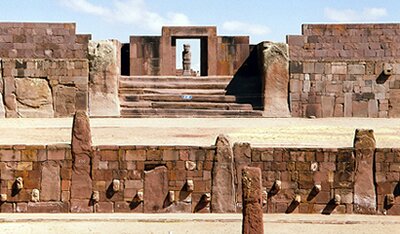Andean Aymará people celebrate the coming of New Year 5519
Accompanied by Andean highlands rituals in the citadel of Tiwanacu, to the north of Bolivia’s capital La Paz the indigenous Aymará will celebrate on Tuesday the coming of the Aymará New Year, 5519.
 |
| The citadel of Tiwanacu & the Gate of the Sun |
People will converge at Tiwanacu as morning light dawns at 06:42 Bolivian time when sun rays will filter through the “Gate of the Sun” worked in stone, and one of the main icons of the Andean citadel.
“The cosmic rays radiate much positive energy, an omen that the coming year is going to be a good one” proclaimed Cesar Cocarico, governor of La Paz County and member of the Aymara culture, the most extended to the west of Bolivia, south of Peru and north of Chile and Argentina.
In all Aymará villages in South America ceremonies and rituals will be held to celebrate the coming of Willka Kuti which means the Return of the Sun.
Bolivia’s first indigenous president Evo Morales to further promote the Indian roots of the country declared June 21st a national holiday which in the calendar figures as the “Andean and Amazon Year”, thus guaranteeing celebrations by the 36 different indigenous groups of the country.
The arrival of the year 5519 coincides with the winter solstice in the southern hemisphere. In the west of Bolivia the celebration is “Willka Kuti” (Return of the Sun) while to the east takes place the welcome of “dawn’s morning star”.
 |
| Tiwanacu |
But the main ceremony takes place at the Tiwanacu citadel with shows of Andean music and an incredible display of indigenous wind instruments which animate the celebration before the sun turns up in the freezing dawn with temperatures fringing 6 degrees below zero.
The Tiwanacu citadel dates back 1.400 years BC and is made up of seven main constructions Kalasasaya, Pirámide de Akapana, Kanta Tallita, Kerikala, Putuni, Puma Punku and Templete, which is semi tunnelled.
Bolivian anthropologists point out that the citadel is not only a grandiose monument because of its stone constructions, but also because of its farming techniques with the “Sucakollo”, an artisanal watering system based on stone canals which follow the terraces displayed one above the other.